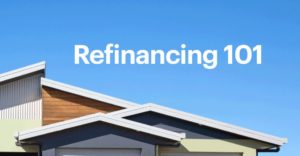
For a multitude of economic reasons, refinancing your mortgage loan could be the perfect solution to help you save a few pennies this year. Your savings will go well beyond just easing up on the monthly mortgage bill. We recognize that rates have gone up since this time last year; rates are still historically low. So, should you be considering refinancing your home?
Suggested Reading: The Arizona Home Plus Program
First of all, what is refinancing?
What does refinancing mean, and how does it work? When you refinance, you are basically swapping out your old loan for a new one.
There are two main types of refinancing:
Rate-and-term refinance:
Rate-and-term refinance means that the remaining balance on your current mortgage is transformed into a new loan that has a better rate and/or term for your situation.
Cash-out refinance:
You liquidate some of your home’s equity, creating a new loan that consists of your previous mortgage balance plus the cash you took out.
You can get a refinance from any mortgage lender you choose—it doesn’t have to be from your current lender. We encourage you to shop around when refinancing your mortgage.
Let’s go over some of the major reasons which refinancing your mortgage may be right for you.
So why might you consider refinancing in the first place? It all depends on your goals. People choose to refinance for a diverse set of reasons, but here are some of the more common motivations I see:
If rates have dropped since you obtained your original mortgage, you may be able to refinance into a loan with a lower rate. Doing so can reduce the amount of interest you pay and lower your monthly payments, meaning you’ll also pay less over the life of your loan.
Or, has the value of your home gone up, or have you paid off a good chunk of your mortgage? Having earned that additional equity in your home, you may be able to get a better rate regardless of current rate trends. Or if you currently pay mortgage insurance, but now have more than 20% equity in your home, you may be able to refinance to cancel your mortgage insurance payments.
If your credit score has gotten a significant boost, you may also be able to refinance and get a better rate. For example, depending on the specifics of the loan, a 20-point increase in your credit score could reduce your rate and help you save thousands of dollars in interest over the life of the loan.
While adjustable-rate mortgages (ARMs) can save you money on your monthly mortgage payment in the early years of owning a home, once the fixed period ends, your interest rate may increase significantly. You can avoid this by switching from an ARM to a fixed-rate mortgage. While your new fixed rate will likely be higher than your original adjustable rate, you’ll be protected from future rate increases.
In some cases, changing the length of your loan when refinancing can be advantageous. If you can afford higher monthly payments, thanks to an increase in income, you could refinance into a shorter loan (such as from a 30-year fixed to a 15-year fixed) to pay off your mortgage faster, saving thousands of dollars in interest payments over the life of the loan.
As I mentioned earlier, you can also do a cash-out refinance, which allows you to use the equity you’ve built in your home to borrow money at a low cost. Taking cash out can be useful if you need extra money for everything from making home improvements to expenses such as education or medical costs and do not have access to other funds.
Debt consolidation is also a great way to utilize a refinance. Your lifestyle and financial situation might be one that is best managed by consolidating all debt into a single more affordable payment.
This can be especially helpful if you have high-interest loans and debts like credit card debt, student loans, or a second mortgage. A debt consolidation refinance is technically considered a cash-out refinance, so the two work in a similar way. Essentially, a portion of your home equity is turned into cash out that you can use to pay off other loans and debts. Your old mortgage will be replaced by a new one that includes the amount you took out to pay those other debts.
So what’s the verdict? Is refinancing right for you?
While there can be many benefits to refinancing, it’s important to remember that you’ll still have to complete a loan application and pay closing costs, similar to the ones you paid when you got your original mortgage. You’ll typically have to pay things like bank/lender fees, appraisal fees, and title insurance fees.
Review your options
We’re more than happy to help walk you through your refinance options and find the right choice for you. You can schedule a call with one of our knowledgeable staff or you can get started on your refinance journey here.
The Certo Team
55 N. Arizona Place Suite #103
Chandler, AZ 85225
602-429-6789
